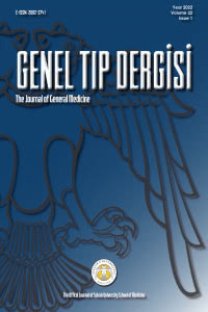Serebral palsili çocukların beslenme sorunları ve ailenin tutumu
Yutma bozuklukları, Beslenme bozuklukları, Beslenme durumu, Çocuk, Çocuk beslenme bozuklukları, Beyin felci, Aile, Yeme bozuklukları, Sağlık tutumu, Enteral beslenme, Bilgi, Tavırlar, Pratik, Beyin hasarı, kronik, Tutum, Çocukluk çağında beslenme ve yeme bozuklukları, Sağlık personeli-aile ilişkileri
Feeding problems of children with cerebral palsy at home and attitude of their family
Deglutition Disorders, Nutrition Disorders, Nutritional Status, Child, Child Nutrition Disorders, Cerebral Palsy, Family, Eating Disorders, Attitude to Health, Enteral Nutrition, Knowledge, Attitudes, Practice, Brain Damage, Chronic, Attitude, Feeding and Eating Disorders of Childhood, Professional-Family Relations,
___
- Hall, DMB. The child with handicap. Blackwell Scientific Publ. 1984, p. 303-55.
- Güneysu S. Cerebral palsy’li çocuğun beslenmesi. Beslenme ve Diyet Derg 1987; 16:233-5.
- The Merck Manual of Diagnosis and Therapy, 16th ed. USA: Merck & Co. Inc.-1992, p.2263-4.
- Bhushan V, Paneth N, Kiely JL. Impact of improved survival of very low birth weight infants on recent secular trends in the prevalence of cerebral palsy. Pediatrics 1993; 91:1094-100.
- Aksayan S, Cimete G. Evde bakım. Sürekli Tıp Eğitimi Derg 1998; 7:202-4.
- Courel MJ, Bisset R, Miller R, Thomas A, Clarke M. Assessment of feeding problems in neurodevelopmental handicap: A team approach. Arch Dis Child 1993; 69:609-13.
- Anonym. Position of the American Dietetic Association: Nutrition in comprehensive program planning for persons with developmental disabilities. J Am Diet Assoc 1992,;92:613-5.
- Anonym. Growth and nutrition in children with cerebral palsy. Lancet 1990, 335:1253-4.
- Rosenbaum PL, King SM, Cadman DT. Measuring processes of caregiving to physically disabled children and their families. I: Identifying relevant components of care. Dev Med& Child Neurol, 1992, 34:103-14.
- Stallings VA, Charney EB, Davies JC, Cronk CE. Nutrition-related growth failure of children with quadriplegic cerebral palsy. Dev Med Child Neurol 1993,35:126-38.
- Reilly S, Skuse D. Characteristic and management of feeding problems of young children with cerebral palsy. Dev Med Child Neurol 1992,34:379-88.
- Risel EG, Patrick J. Identification of children with cerebral palsy unable to maintain a normal nutritional state. Lancet 1988, 1:283-6.
- ISSN: 2602-3741
- Yayın Aralığı: Yılda 6 Sayı
- Başlangıç: 1997
- Yayıncı: SELÇUK ÜNİVERSİTESİ > TIP FAKÜLTESİ
Tıkanma sarılığında serum C-RP düzeyleri
Mustafa ŞAHİN, Hüsamettin VATANSEV, Faruk AKSOY, Serdar YOL, SÜLEYMAN ŞAKİR TAVLI, Adil KARTAL, Ersin ÇİFTÇİ
Serebral palsili çocukların beslenme sorunları ve ailenin tutumu
Mustafa ÖZTÜRK, Dudu DÜNDAR, Nurhan G. YILDIRIM, Halime H. HİMMETOĞLU, Halime YILMAZ
DİLEK SEMA ARICI, Gökhan GÖKÇE, Handan AKER, Hakan KILIÇARSLAN
İnsan fötuslarında damar gelişimlerinin mikrodiseksiyonla incelenmesi
Mustafa BÜYÜKMUMCU, MUZAFFER ŞEKER, A. Kağan KARABULUT, Taner ZİYLAN, İSMİHAN İLKNUR UYSAL
Çocuklarda anti-HAV ve anti-HEV seropozitifliği
Esra ALİBEY, Zafer ÇETİNKAYA, Beril ÖZBAKKALOĞLU, Ahmet Z. ŞENGİL
Osman GENÇ, Günfer TURGUT, Türker ŞAHİNER
Eskişehir' deki sağlık kuruluşlarında çalışan hemşirelerin AIDS hakkındaki bilgi düzeyi
Alaettin ÜNSAL, Selma METİNTAŞ, M. Ali SARIBOYACI, O'ben Çiğdem İNAN
